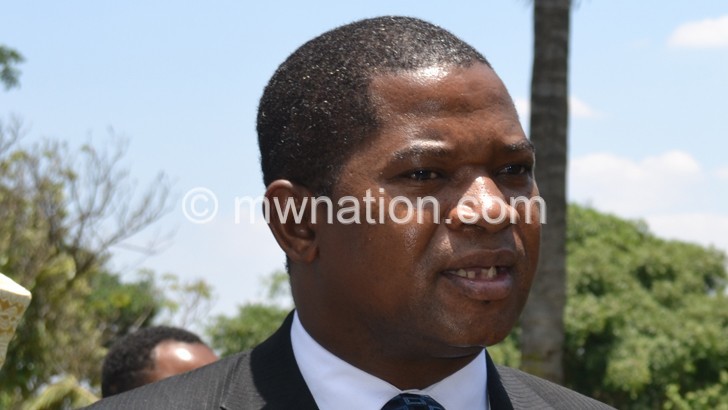Law society faults Apm on parastatal appointments
The Malawi Law Society (MLS) has described as abuse of power the President’s decision to bypass boards in the appointment of Escom and Mera chief executive officers (CEOs).
The hiring of the CEOs also contradicts the spirit of reforms in parastatals which President Peter Mutharika approved in September 2015, as championed by the Public Service Reform Commission, to make 46 corporations independent and improve efficiency.

But Comptroller (PS) for Statutory Corporation Stewart Ligomeka has defended the appointments of Allexon Chiwaya, who has replaced Evelyn Mwapasa at Escom, and Collins Magalasi, the President’s former chief economic adviser, as Mera boss.
He argued that the President has overriding powers to appoint a CEO to any parastatal, despite the board having such mandate.
In a telephone interview with Nation on Sunday, Escom board chairperson Perks Ligoya said the ‘appointing authority’—which is government—made both the appointment of Chiwaya, and the redeployment of Mwapasa.
But according to Escom’s Memorandum and Articles of Association, the board is vested with powers to recruit the CEO and senior executive management members.
Asked why the board did not hire the CEO as empowered by the articles of association, Ligoya referred Nation on Sunday to Escom’s public relations office.
In an e-mail response, Escom corporate communications officer Mervin Mchenga also confirmed that government made the appointment of the new CEO.
But an Escom board member, who refused to be named, claimed the board was not consulted on the appointment, but were just informed of it.
According to the board member, they also learnt of Mwapasa’s redeployment in the press.
“I am hearing it from you that there are rules which empower us to appoint the CEO. I do not know about that. In our orientation, we were told that our powers are limited to the appointment of senior executive management such as directors, and not the CEO. I wish you shared a copy of our constitution so we can argue from an informed point,” said the board member.
According to Mera public relations officer Fitina Khonje, Magalasi reported for duties at the institution last week.
But she could not explain who—between government and the board—appointed Magalasi, referring Nation on Sunday to Ishmail Chioko, Mera director of legal affairs and board secretary, who could not be reached on his mobile on several attempts.
In a separate interview, last week, a Mera board member, who opted for anonymity, said he was aware of Magalasi’s appointment, but was not aware who made it.
“We are expected to have a meeting this week or next week. I think we are likely to be told of this appointment. You see, we are appointed by the President. So, I believe when he makes a decision, such as an appointment, we cannot say no,” said the source.
According to the Energy Act of 2004, the Mera Board is the appointing authority for the CEO. The Act stipulates: “The authority shall appoint a chief executive officer to be known by such title as the authority may deem fit, who shall be the chief executive officer of the authority and responsible for the administrative control of, and supervision over the work and staff of the authority”.
In an interview with Nation on Sunday, MLS secretary Michael Goba Chipeta described the President’s appointments of Escom and Mera CEOs as ‘plainly wrong and illegal’, emphasising the need to allow boards exercise their mandate.
“First, I have not seen or read the Memorandum and Articles of Association for Escom. As such, I cannot comment much on the appointment of the Escom CEO. However, if the power to appoint the CEO of Escom under those documents vests in the board, without any indication of a situation under which the President can make such an appointment, then the appointment made by the President is plain wrong and illegal,” he said.
On Mera, Goba Chipeta said the Energy Regulations Act makes a clear distinction on who the President and Mera Board can appoint, in as far as the constitution of Mera is concerned.
“Under Section 18 of the Act, the power to appoint the chief executive of Mera vests in Mera (board) and not the President. The Act is just that candid. It is plain wrong and illegal, therefore, for the President to appoint the chief executive of Mera, when he does not have such powers,” he said.
Chipeta further faulted Ligomeka’s explanation as ‘completely misguided and unsupported by the law’.
“Section 6 of the Public Service Act, which gives the President power to appoint any person in the public service, subject to the Constitution, to a post above the rank of Under Secretary, does not, in such circumstance where Parliament has drawn very clear lines on who should appoint who, give power to the President to appoint the chief executive of Mera. Further, the post of chief executive of Mera does not fit the definition of ‘post above the rank of Under Secretary’,” he said.
In an e-mailed response, Ligomeka insisted that there is nothing wrong with the President making such appointment, even when such mandate is vested in the board.
“You may wish to note that human resource management and development in the public service is mainly governed by the Public Service Act. You may further wish to note that Section 6 of the Act mandates the State President to appoint any deserving individual to any post above the rank of the undersecretary. Thus, all the other laws on appointment in the public service are subservient to the Public Service Act,” said Ligomeka.





